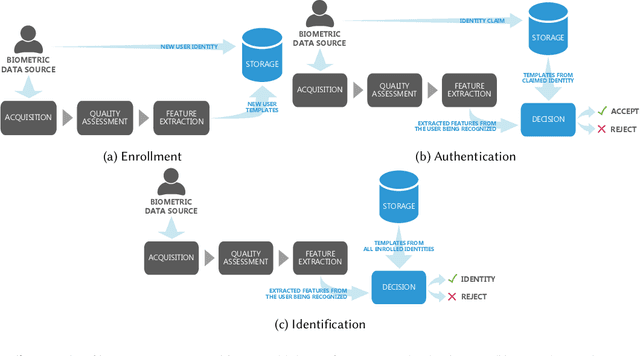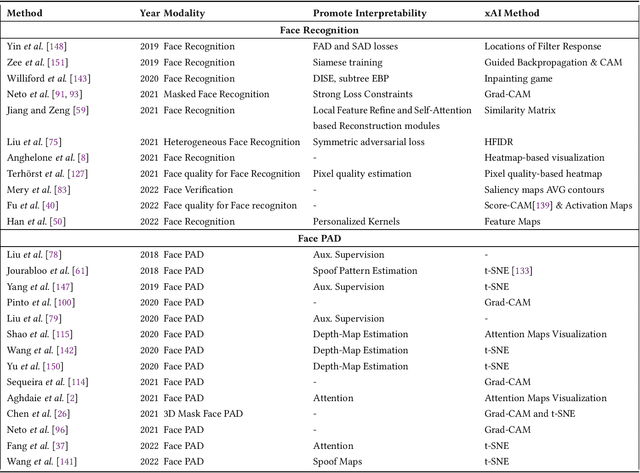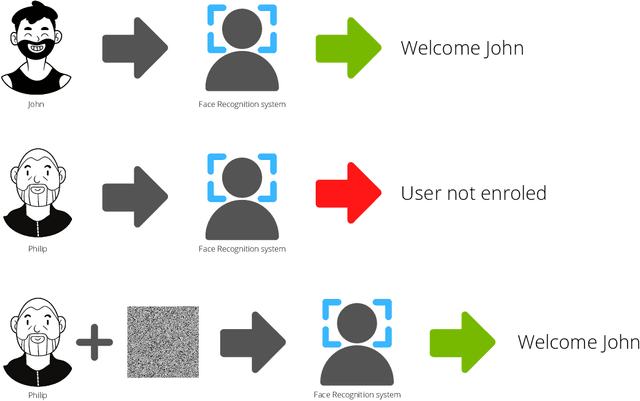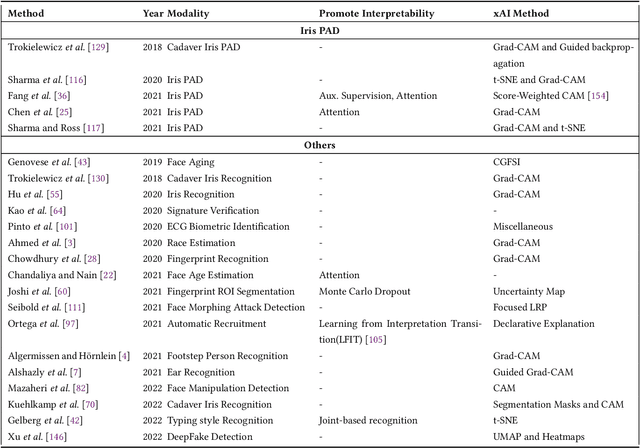João Ribeiro Pinto
Seamless Multimodal Biometrics for Continuous Personalised Wellbeing Monitoring
Jan 19, 2023Abstract:Artificially intelligent perception is increasingly present in the lives of every one of us. Vehicles are no exception, (...) In the near future, pattern recognition will have an even stronger role in vehicles, as self-driving cars will require automated ways to understand what is happening around (and within) them and act accordingly. (...) This doctoral work focused on advancing in-vehicle sensing through the research of novel computer vision and pattern recognition methodologies for both biometrics and wellbeing monitoring. The main focus has been on electrocardiogram (ECG) biometrics, a trait well-known for its potential for seamless driver monitoring. Major efforts were devoted to achieving improved performance in identification and identity verification in off-the-person scenarios, well-known for increased noise and variability. Here, end-to-end deep learning ECG biometric solutions were proposed and important topics were addressed such as cross-database and long-term performance, waveform relevance through explainability, and interlead conversion. Face biometrics, a natural complement to the ECG in seamless unconstrained scenarios, was also studied in this work. The open challenges of masked face recognition and interpretability in biometrics were tackled in an effort to evolve towards algorithms that are more transparent, trustworthy, and robust to significant occlusions. Within the topic of wellbeing monitoring, improved solutions to multimodal emotion recognition in groups of people and activity/violence recognition in in-vehicle scenarios were proposed. At last, we also proposed a novel way to learn template security within end-to-end models, dismissing additional separate encryption processes, and a self-supervised learning approach tailored to sequential data, in order to ensure data security and optimal performance. (...)
Explainable Biometrics in the Age of Deep Learning
Aug 19, 2022



Abstract:Systems capable of analyzing and quantifying human physical or behavioral traits, known as biometrics systems, are growing in use and application variability. Since its evolution from handcrafted features and traditional machine learning to deep learning and automatic feature extraction, the performance of biometric systems increased to outstanding values. Nonetheless, the cost of this fast progression is still not understood. Due to its opacity, deep neural networks are difficult to understand and analyze, hence, hidden capacities or decisions motivated by the wrong motives are a potential risk. Researchers have started to pivot their focus towards the understanding of deep neural networks and the explanation of their predictions. In this paper, we provide a review of the current state of explainable biometrics based on the study of 47 papers and discuss comprehensively the direction in which this field should be developed.
FocusFace: Multi-task Contrastive Learning for Masked Face Recognition
Nov 01, 2021



Abstract:SARS-CoV-2 has presented direct and indirect challenges to the scientific community. One of the most prominent indirect challenges advents from the mandatory use of face masks in a large number of countries. Face recognition methods struggle to perform identity verification with similar accuracy on masked and unmasked individuals. It has been shown that the performance of these methods drops considerably in the presence of face masks, especially if the reference image is unmasked. We propose FocusFace, a multi-task architecture that uses contrastive learning to be able to accurately perform masked face recognition. The proposed architecture is designed to be trained from scratch or to work on top of state-of-the-art face recognition methods without sacrificing the capabilities of a existing models in conventional face recognition tasks. We also explore different approaches to design the contrastive learning module. Results are presented in terms of masked-masked (M-M) and unmasked-masked (U-M) face verification performance. For both settings, the results are on par with published methods, but for M-M specifically, the proposed method was able to outperform all the solutions that it was compared to. We further show that when using our method on top of already existing methods the training computational costs decrease significantly while retaining similar performances. The implementation and the trained models are available at GitHub.
My Eyes Are Up Here: Promoting Focus on Uncovered Regions in Masked Face Recognition
Aug 18, 2021



Abstract:The recent Covid-19 pandemic and the fact that wearing masks in public is now mandatory in several countries, created challenges in the use of face recognition systems (FRS). In this work, we address the challenge of masked face recognition (MFR) and focus on evaluating the verification performance in FRS when verifying masked vs unmasked faces compared to verifying only unmasked faces. We propose a methodology that combines the traditional triplet loss and the mean squared error (MSE) intending to improve the robustness of an MFR system in the masked-unmasked comparison mode. The results obtained by our proposed method show improvements in a detailed step-wise ablation study. The conducted study showed significant performance gains induced by our proposed training paradigm and modified triplet loss on two evaluation databases.
 Add to Chrome
Add to Chrome Add to Firefox
Add to Firefox Add to Edge
Add to Edge